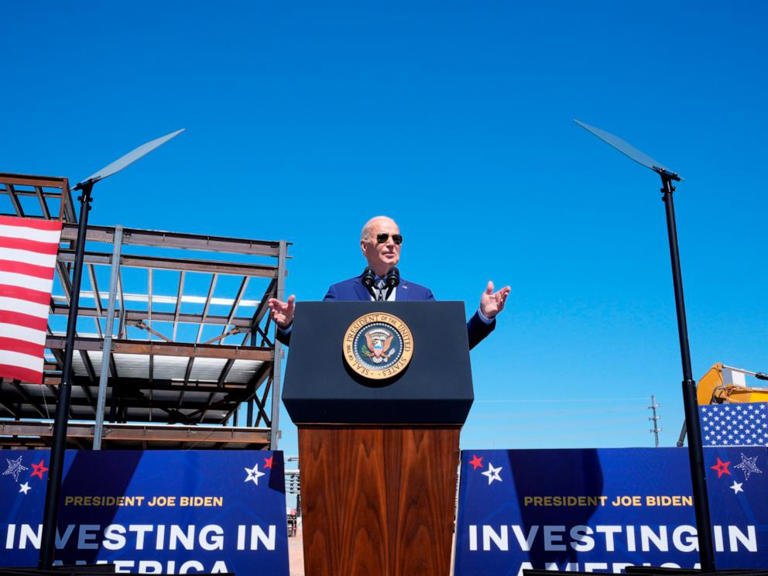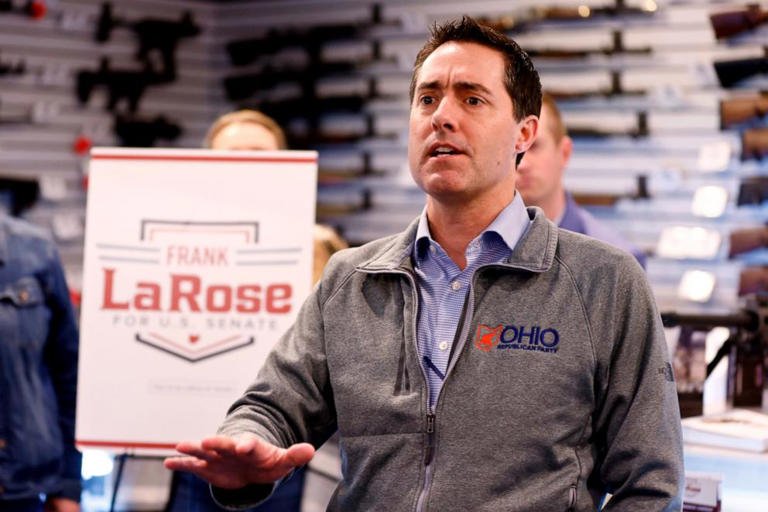Legal counsel for Ohio’s top election official, a Republican, sent a letter on Monday signaling that the secretary of state’s office can’t accept a proposed workaround to certifying President Joe Biden on the state’s November general election ballot amid a conflict with the Democratic National Committee over convention scheduling and confirming Biden as the party’s official nominee.
Secretary of State Frank LaRose’s attorney threw cold water on a new proposal by a Democratic lawyer to provisionally certify Biden and Vice President Kamala Harris — that is, formally notify the state before the party’s August convention whom they expect to be the nominee so that both candidates can be on Ohio’s ballot before the state’s Aug. 7 ballot certification deadline.
LaRose’s attorney asked the Ohio Democratic Party to provide clarification as to how they intend to comply with state law. Possible courses of action brought up in his initial letter were moving up the party convention or seeking a legislative fix like an exemption.
In a letter received by the Ohio secretary of state last week, Ohio-based attorney Donald McTigue, who appears to be working with the Democratic Party, based on his letter — though the Biden campaign declined to confirm or deny that — said that Democrats could provisionally certify Biden and Harris by Aug. 7 and later technically confirm the results at the convention.
But the “notion of providing a ‘provisional certification’ by the statutory deadline simply is not provided for by law,” according to the Ohio’s attorney general’s office, whom LaRose’s Chief Legal Counsel Paul Disantis cited in the letter on Monday, which was obtained by ABC News.
Disantis also said he saw some ambiguity in McTigue proposals.
“You use the personal pronoun ‘we’ throughout the document, but I am unclear on whose behalf you are communicating,” Disantis wrote.

LaRose’s office had alerted both Ohio and the DNC on April 5 of “an apparent conflict in Ohio law” between the national party’s nominating process and the deadline by which their presidential pick must be certified to the secretary of state’s office.
Alabama and then Washington later raised similar concerns. As in Ohio, state lawmakers previously enacted exemptions for cases when national parties held their conventions after the deadlines — and the candidates still appeared on the ballot.
The Biden campaign has said their first line of defense in combating these calendar issues rests on the provisional certification of Biden and Harris.
Reacting to LaRose’s letter on Monday, the Biden campaign provided the same response they’ve delivered since these conflicts arose earlier this month.
“Joe Biden will be on the ballot in all 50 states. State officials have the ability to grant provisional ballot access certification prior to the conclusion of presidential nominating conventions. In 2020 alone, states like Alabama, Illinois, Montana, and Washington all allowed provisional certification for Democratic and Republican nominees,” a Biden campaign spokesperson said.
Like in Ohio, Alabama’s Secretary of State Wes Allen, another Republican, quashed the idea that he would provide “for ‘provisional certifications’ or any other exceptions” after an attorney representing the Biden campaign sent a letter saying the DNC could do so by the state’s Aug. 15 deadline and then later confirm the results at the convention.
In Washington, Democratic Secretary Steve Hobbs has indicated that their office will make an exception to their deadlines if the DNC submits a provisional certification for Biden and Harris.
If provisional ballot certification cannot be achieved in the places where the president is facing ballot access uncertainty, Biden officials have said their strategy would shift to the state legislatures, where they would push to carve out extensions, like in the past.
This legislative action has been done before in Ohio, where laws were passed ahead of both the 2012 and 2020 elections to skirt around the state’s 90-day deadline for nomination ahead of an election.
In their initial letter to Democrats regarding the calendar conflict, legal counsel for LaRose in Ohio suggested legislative action by a May 9 deadline.
It’s unclear, however, how willing the majority-GOP Legislature would be in working with Democrats on this issue.
Ohio Senate President Matt Huffman, a Republican, said in a podcast last week that the issue was a “Democratic problem” but that if they had a proposed solution, he’s “all ears.”










